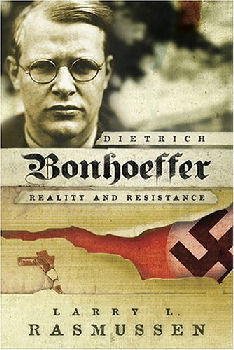
|
Posted April 15, 2006
Book: Dietrich Bonhoeffer: Reality and Resistance Author: Larry L. Rasmussen Westminister John Knox Press, Louisville, KY, 2005, pp. 222 An Excerpt from the Jacket:
An Excerpt from the Book: Millions of Germans not only prided themselves in obeying orders, they prided themselves in obeying laws. Nazism rewarded this pride with praise. Obedience to law was a value lauded only slightly less than self-sacrifice (to the state), and the organs of propaganda drilled it home. The Nazi terror is in fact incomprehensible apart form the pedantic correctness, bureaucratic routinization, and unswerving adherence to formalities and legalities by legions upon legions of Germans. The Third Reich was the antithesis of anarchy; its so-called “lawlessness” was actually gross misrule by law. Amassed injustice was organized and carried out precisely through obedience to laws and orders. The content of the laws and orders was easily altered. The formalism and functionalism remained. To be sure, the resisters could rightly say: “The principle of legality, now trampled underfoot, must be elevated once again to a position of supremacy over all conditions of human life”; for there were sufficient example of arbitrary action. But, more importantly, it is a definite content in “the principle of legality: that could not be cast aside or considered exchangeable for the men of the resistance. That content had to harmonize with the basic rights guaranteed all men “regardless of race, nationality or creed.” Yet apart from their concern for such content, the point to be made is that the conspirators shared with virtually all Germans an obsession with legality as a highly valued measurement of the moral life. The conspirator’s efforts to juristically justify a Putsch were tireless. Even the July 20 strike was conceived as a quasi-legal revolt. In short, Bonhoeffer echoes the general tone among the resisters with his use of legal to illegal and nonviolent to violent guidelines as the normative ones for determining the moral legitimacy of political means. Even when the actions present on the scales are extremely wide-ranging – conspiratorial conversation to assassination — the weight of emphasis is crucial. For the resisters, the weight was heavily on the legal and nonviolent sides. If anything, Bonhoeffer is among the more daring and the more emphatic in maintaining that the illegal, possibly violent, “deed of free responsibility” is a supremely moral deed. But Bonhoeffer also expresses the hesitation characteristic of all with the words: “Each of these men, the one who is bound by the law and the one who acts in free responsibility, must hear and bow before the accusation of the other. Neither can be judge for the other. It is always for God to judge. Table of Contents: Part I: Theology and Resistance 1. Reality, Christology, and structure of ethics 2. Christological ethics and resistance 3. Letters and papers from prison and resistance 4. Summary and conclusion of Part I Part II: Pacifism and Tyrannicide 1. The character of Bonhoeffer’s pacifism 2. The measuring of tyrannicide Part III: Critique 1. Critique of methodology 2. Critique of resistance — Bonhoeffer as a moral profile of the military/political conspiracy Appendixes A. Bonhoeffer, Gandhi, and Resistance B. Letters from Dietrich Bonheoffer to Reinhold Niebuhr |
|
